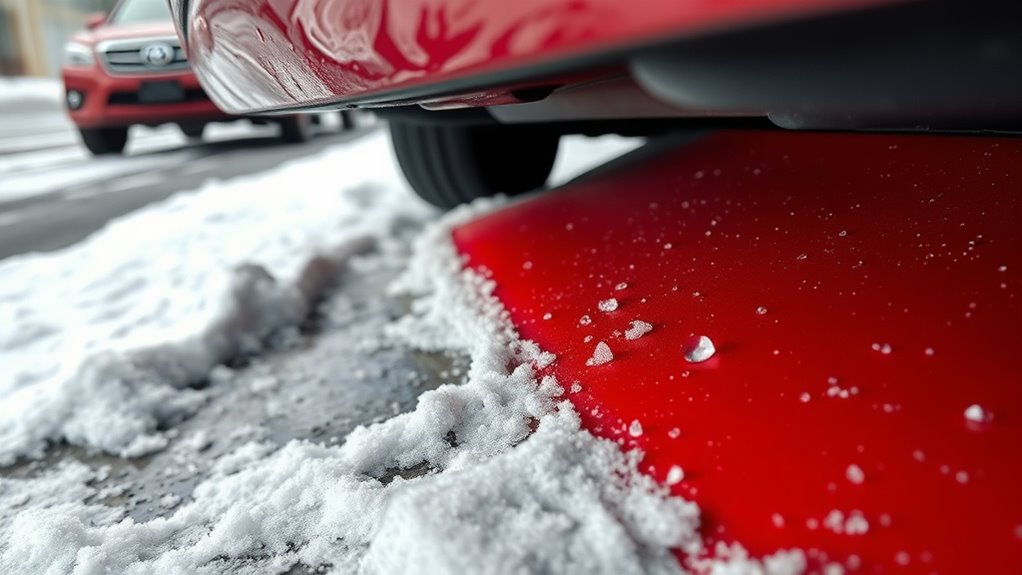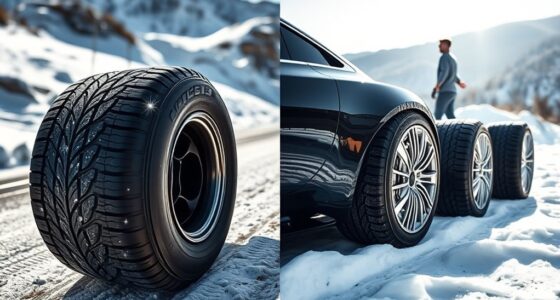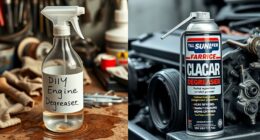To prevent rust from road salt in winter, regularly wash your vehicle, especially the undercarriage and wheel wells, using high-pressure water to remove salt deposits. Apply corrosion inhibitors or protective coatings like wax or rust-proofing treatments to act as barriers against moisture and salt. Park in a garage or sheltered area when possible, and inspect your vehicle often for chips or scratches, addressing issues promptly. For more ways to protect your vehicle effectively, keep exploring helpful tips.
Key Takeaways
- Regularly wash your vehicle, especially the underside and wheel wells, to remove accumulated salt and moisture.
- Apply corrosion inhibitors or protective coatings to create a barrier against salt and prevent rust formation.
- Reapply wax or sealant periodically during winter for durable surface protection against salt and moisture.
- Park in a garage or sheltered area to minimize salt exposure and reduce rust risk.
- Promptly repair paint chips or scratches to expose less metal and prevent rust from developing.

When winter roads are treated with salt to melt ice, it can quickly lead to rust forming on your vehicle’s metal parts. Salt accelerates corrosion by attracting moisture and creating an electrolyte that promotes oxidation. To combat this, you should consider applying corrosion inhibitors, which are chemicals designed to slow down or prevent rust formation. These inhibitors form a protective barrier on the metal surface, reducing contact with salt and moisture. Regularly applying a corrosion inhibitor spray or coating can greatly extend your vehicle’s lifespan during winter months.
Salt on winter roads causes rust by attracting moisture and promoting oxidation. Apply corrosion inhibitors to protect your vehicle.
Another effective strategy is to use protective coatings on vulnerable areas of your vehicle. These coatings act as a physical barrier, preventing salt and moisture from reaching the metal. You might opt for a high-quality wax or sealant that provides a durable layer of protection. For added defense, consider applying a specialized undercoating or rust-proofing treatment to the underside of your vehicle, where salt tends to accumulate and cause the most damage. These protective coatings are especially useful because they can be reapplied periodically, maintaining their barrier properties throughout the winter.
Beyond applying these protective substances, regular maintenance is essential. After each snowstorm or road salt application, wash your vehicle thoroughly, paying close attention to the underside, wheel wells, and door edges. Use a hose with a high-pressure nozzle to flush out salt deposits from hard-to-reach areas. This simple step prevents salt from lingering and causing corrosion over time. Dry your vehicle afterward to avoid residual moisture that could foster rust. If you notice any chips or scratches in the paint, touch them up promptly, as exposed metal is highly susceptible to corrosion.
Furthermore, parking your vehicle in a garage or sheltered area can help limit exposure to salt and moisture. If a garage isn’t available, consider using a car cover designed for winter conditions. These covers can help keep salt and snow off your vehicle, reducing the risk of corrosion. Additionally, choosing corrosion inhibitors that are compatible with your vehicle’s materials can enhance your protection strategy. Regular inspections are also essential; look for signs of rust or paint damage and address them immediately to prevent further deterioration.
Frequently Asked Questions
How Long Does Road Salt Typically Stay Active on Vehicles?
Road salt typically stays active on your vehicle for about a week or more, depending on weather conditions. Salt residue can linger if you don’t wash your vehicle thoroughly, especially in crevices. It can break down your vehicle coating, leading to rust over time. To minimize damage, wash off salt residue promptly after winter drives, ensuring your vehicle’s coating stays intact and protected from corrosion.
Are There Eco-Friendly Alternatives to Traditional Road Salt?
You might want to explore eco-friendly deicers or natural rust inhibitors as alternatives to traditional road salt. These options are designed to be less harmful to the environment while still melting ice effectively. Eco-friendly deicers often use organic or biodegradable ingredients, reducing corrosion and ecological impact. Natural rust inhibitors can help protect your vehicle from rust without relying on harsh chemicals, making them a smart choice for environmentally conscious winter driving.
Can Washing a Vehicle Immediately After Snow Help Prevent Rust?
Like a knight shielding their armor, washing your vehicle after snow acts as a crucial rust prevention technique. You see, car wash benefits extend beyond cleanliness; they remove harmful road salt and grime that accelerate rust. By promptly rinsing off salt, you help preserve your car’s metal integrity, reducing corrosion risks. Regular washes during winter are essential rust prevention techniques, ensuring your vehicle stays protected and looking great despite the harsh elements.
Do Different Vehicle Materials Require Unique Rust Prevention Methods?
Different vehicle materials do require unique rust prevention methods. For instance, if your car has paint protection, regular washing helps remove salt and debris. For exposed metal or undercarriage, applying an undercarriage coating creates a barrier against moisture and salt. You should tailor your approach based on your vehicle’s materials, ensuring each part gets the right protection to prevent rust, especially during winter conditions.
How Does Temperature Influence Salt-Induced Rust Formation?
Imagine a car parked during a cold snap, and you notice rust spots forming faster than usual. Temperature effects profoundly influence salt-induced rust formation because colder temperatures slow down metal’s natural oxidation but also cause salt to stick longer. This rust acceleration occurs because moisture from snow and ice lingers, creating the perfect environment for rust to develop. So, lower temperatures can actually increase the risk of faster rust formation.
Conclusion
To keep your vehicle rust-free through winter, remember to wash off road salt regularly and apply protective coatings. Don’t forget to inspect and touch up any chips or scratches promptly—think of it as your armor against the elements. Staying diligent now can save you from costly repairs later, much like a knight guarding his castle. So, stay vigilant, and your car will thank you for your efforts, remaining shiny and strong well into the future.









